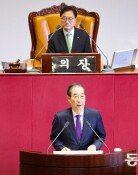Monitors Cleaning Up Co-op Elections
A West Busan Election Commission election surveillance team entered a tent at a Busan port where four owners of small-scale fishing boats were having a drink at 5:00 p.m. yesterday, the day before elections to select the head of the Busan Federation of Fisheries Cooperative.
When the head of the surveillance team, Lee Eun-hee, asked, Did the candidates visit today? Choi Hong-gil (64) immediately expressed his chagrin, saying, Hey, those guys are already rich. Why cant they let poor people like us afford drinks?
Sohn Soon-taek (60), who was having a drink with them, silenced Choi by saying, If they get elected by passing drinks around, they would steal.
Lee responded, Elections at the cooperative are also under the supervision of the election commission. If you accept soju from them, you will have to pay a fine. Kim (66) responded, I wish theyd give us a piece of candy at least. They dont even do that anymore.
Whereas previous elections were characterized by feverishand sometimes fraudulentelection activities, agriculture, fisheries, and forestry cooperative elections have become surprisingly clean recently. With the implementation of amendments in each cooperative starting last June, the National Election Commission has been supervising the cooperative elections.
Since the Forestry Cooperatives Federation election held last June at Hampyeong-gun, South Jeolla Province, the Election Committee has supervised a total of 783 regions (1,207,759 voters). Two hundred fifty-nine elections were held last year, and 524 were held this January and February.
The head of the local cooperative is paid 50 million won annually, along with separate activity fees, and is accorded status befitting the head of a local institution. This is why in the past, cooperative elections were so competitive that some wanted to abolish the direct election process altogether. After each election, the aftermath was extensive.
The Election Commission and cooperatives all agree that at least now, the practice of blatantly buying votes has disappeared from the electoral scene.
At the cooperative elections to be held in March at the Sinbuk Agricultural Cooperative Federation at Yeongam-gun, South Jeolla Province, candidate Choi Gyu-geun said, These days, its worth trying out for the elections. He attributes this to the more transparent environment compared to 2002. Back then, 20 to 30 people would come visit each evening and say that the other candidate is buying drinks for voters. Why arent we doing anything? and prompt me to buy dinner. Sometimes non-cooperative members would be included in their midst. Now they wouldnt dare, even if I offered to buy. If they get caught theyd have to pay fines.
Another candidate, Lee Gi-woo, said, I decided to run because the election commission is in charge. In the past, the cooperative members expected some sort of treat, but candidates are now able to run without the financial burden of paying for them.
Candidate Yoon Young-gil, who is running for the head position at the Fisheries Cooperative located at Gangneung, Gangwon Province on March 7, said, Until now, during election season, local restaurants would be packed, and people without money didnt have a fair chance in the elections. I hope the elections will carry on in this atmosphere.
There were also views that the supervision of the Election Committee would aid the work of the cooperatives.
Lim Sang-bong, who was elected as head of the Busan Federation of Fisheries Cooperative, said, Until now, the newly elected cooperative head could not perform well because they had to keep going to the prosecutors office or court every two or three years due to election fraud charges.
An official at the Election Committee said, Daily elections such as cooperative elections affect the election atmosphere much more that the official elections. A more conducive atmosphere for cooperative elections will greatly affect public elections.
Kang-Myoung Chang tesomiom@donga.com







